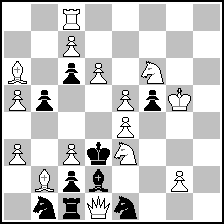
Website founded by
Milan Velimirović
in 2006
22:50 UTC


| |
MatPlus.Net  Forum Forum  General General  On the subject of e2-e1=N!, find a shorter proof game On the subject of e2-e1=N!, find a shorter proof game |
| |
|
|
|
|
You can only view this page!
| | | (1) Posted by James Malcom [Saturday, Nov 6, 2021 22:10] | On the subject of e2-e1=N!, find a shorter proof game
Here is a well-known cooked #2 by Dawson.
Thomas R. Dawson, Tidskrift för Schack 1923, #2
 (= 15+9 ) (= 15+9 )
1. axb6+! Kxe3 2. Qe2#?
No! Another possibility exists: e2-e1=N!
Tim Krabbe writes of this, https://timkr.home.xs4all.nl/admag/promo.htm, "Een van de mooiste uitspraken in de Nederlandse schaakliteratuur werd gedaan door Johan Barendregt (1924-1982), in een interview met Max Pam: 'Mijn leven is bepaald door de zet e2-e1P."
In English: "One of the most beautiful statements in Dutch chess literature was made by Johan Barendregt (1924-1982), in an interview with Max Pam: 'My life is determined by the move e2-e1P.'
Further on, it is written that Barendregt had submitted a proof game in 48.
Last year, I found better in 42 and could not refine it further: 1. b4 a5 2. bxa5 g5 3. Bb2 g4 4. Nc3 g3 5. hxg3 Nf6 6. Rh6 Ne4 7. Nd5 Nc3 8. Rc1 Nb1 9. Ra6 e5 10. Nf6+ Ke7 11. e4 d5 12. c3 d4 13. Rc2 d3 14. Ra7 dxc2 15. Nh3 Na6 16. d4 c6 17. d5 Nc7 18. Ba6 Kd6 19. Qd3 Kc5 20. d6 Bh6 21. Ke2 Bd2 22. dxc7 h5 23. Ng5 Qd5 24. exd5 e4 25. a3 e3 26. Kf3 h4 27. Qe2 Bf5 28. Kf4 Rae8 29. Ra8 h3 30. Rc8 h2 31. d6 h1=R 32. Nd5 Rc1 33. f3 Be4 34. fxe4 b5 35. Qd1 Rh4+ 36. Kf5 Rf4+ 37. gxf4 Kc4 38. Nh7 Kd3 39. Kg5 f5 40. Nhf6 e2 41. Ne3 Re5 42. fxe5 e1=N
Is this optimal, or is shorter possbile? Whatever logic I put into finding my answer has been lost to me, although I know it took me quite some time.
| | | (2) Posted by Andrew Buchanan [Sunday, Nov 7, 2021 06:06] |
Hi James,
Thanks for posting this here, and in PDB. I have added a second PDB entry with Barendregt's 1937 correction bPf5->e7. In answer to your question, Jacobi and I agree there is no demo proof game possible in 40.0, because there are 41 visible black moves. Neither of us see a reason why 41.0 should not be achievable. The other two problems in Tim's article are also golden, and I have added Bouma's to PDB, as it wasn't there.
| | | (3) Posted by Joose Norri [Sunday, Nov 7, 2021 11:02] |
Re the Bouma: there is a much earlier problem, it must also be a fourmover, where white loses the tempo with 1.h8Q 2.Qh7 3.Qg6. But I'm not sure whether 1.h8R fails precisely because of stalemate. Must search.
| | | (4) Posted by Joose Norri [Sunday, Nov 7, 2021 11:13] |
P1222106. There also the knight promotion is relevant.
| | | (5) Posted by Dmitri Turevski [Sunday, Nov 7, 2021 13:08] |
QUOTE
well-known cooked #2 by Dawson
It seems that this unsoundness falls under "No solution", not "Cook", according to the Codex.
| | | (6) Posted by Andrew Buchanan [Sunday, Nov 7, 2021 13:29] |
Hi Joose thanks so much for sharing this beautiful problem by Siers. I have animated the main lines, including set play.
Hi Dmitri if the problem had no retro content, I would agree that the problem is not cooked. However, in a retro, an indeterminate last move is a perfect example of a "retro cook". The Codex does not address retro soundness. A broader issue is keyword ambiguity for "retro-active" problems (those which contain both forward and retro content). For example in PDB does/should "Promotion" denote events in the past or the future?
| | | (7) Posted by Joost de Heer [Monday, Nov 8, 2021 10:46] |
Cook means that there is another solution. In this case there is no solution, so cook would be the wrong term. If the question was 'Last move?' then the composition would be cooked.
| | | (8) Posted by Andrew Buchanan [Monday, Nov 8, 2021 11:27] |
Hi Joost,
A solution is more than an answer to the stipulation, whose terseness is an artistic effect, and should not be taken over-literally. I and many other retro folk use the term "cook", and by this we generally mean retro cooks. I agree that Dawson's retro-active problem has no (forward) solution, and it also has exactly one (retro) cook. It's very clear.
In the absence of guidance in the Codex to retro terminology, we should grow the language in the obvious way to disambiguate. In the meantime, for a retro-active problem, we should understand that other folks' usage may be different from our own.
I really don't know why you want to stick to stodgy old ambiguous terminology, Joost, rather than embracing the opportunity for clarification which I suggest. It's so obvious :-)
Thanks as usual,
Andrew
| |
No more posts |
MatPlus.Net  Forum Forum  General General  On the subject of e2-e1=N!, find a shorter proof game On the subject of e2-e1=N!, find a shorter proof game |
|
|
|
 ISC 2024
ISC 2024 Forum
Forum  General
General  On the subject of e2-e1=N!, find a shorter proof game
On the subject of e2-e1=N!, find a shorter proof game 


